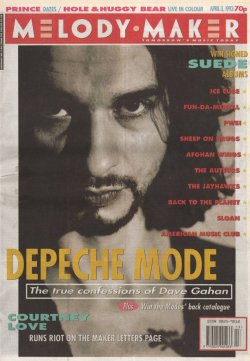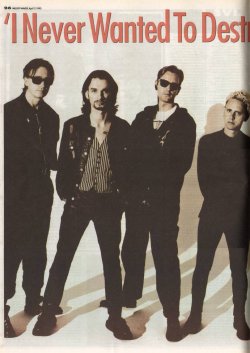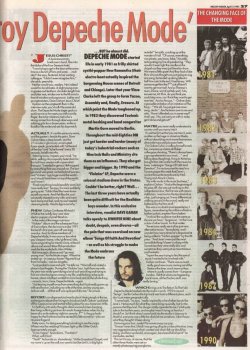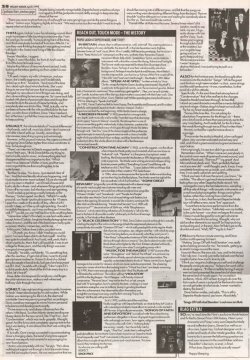- Joined
- Aug 15, 2019
- Messages
- 7,493
- Reaction score
- 143
- Points
- 63
"I Never Wanted To Destroy Depeche Mode"
[Melody Maker, 3rd April 1993. Words: Jennifer Nine. Pictures: Anton Corbijn / Uncredited.]




… But he almost did. DEPECHE MODE started life in early 1981 as frilly shirted synthi-popper New Romantics (their electro-beat actually inspired the burgeoning House scenes of Detroit and Chicago). Later that year Vince Clarke left the group to form Yazoo, Assembly and, finally, Erasure. At which point the Mode toughened up. In 1983 they discovered Teutonic metal-bashing and band songwriter Martin Gore moved to Berlin. Throughout the mid-Eighties DM just got harder and harder (many of today’s industrial-rockers such as Nine Inch Nails and Ministry cite them as an influence). They also got bigger and bigger. By 1990 and the ‘Violator’ LP, Depeche were a colossal stadium draw in the States. Couldn’t be better, right? Well… The last three years have actually been quite difficult for the Basildon boys wonder. In this exclusive interview, vocalist DAVE GAHAN talks openly to JENNIFER NINE about doubt, despair, even divorce – all the pain that was exorcised on new album ‘Songs Of Faith And Devotion’ – as well as his struggle to make the Mode embrace the future.
“Jesus Christ!” A businesswoman, briefcase in hand, flies into the lobby of the Four Seasons hotel.
“I was trying to get in the door at the same time as a bunch of fans and some… rock star!” she says, flustered, to her waiting colleague. “I didn’t even recognise him,” she adds, peevishly.
Neither would you, readers. Nor indeed would his bandmates. A slight young man in goatee and leathers, shoulder-length hair and biker vest, strides over to the lift amid a knot of minders and paparazzi. Ladies and grungemeisters, Dave Gahan! Jesus Christ!
Upstairs on the umpteenth floor in the interview suite, you’d call it the same old show. The Depeche Mode singer grabs a quick sarnie as he meets you with a smile. Roger, the artist-relations man who’s strong-armed him through doorways and sobbing girls for a dozen years, smiles a Buddha-like smile and sets his stopwatch.
ACTUALLY, it’s not the same any more, and the goatee’s beside the point. Dave Gahan takes a deep breath, and for 27 minutes in gloriously uncorrupted Essex-speak, punctuated with “at the end of the day” and “to be honest”, every 30 seconds, he tells me why.
“Moving away, it opens your mind,” he starts, settling into a squashy hotel chair for this half-hour session with a journalist / therapist. “I needed to get out. I felt trapped by everything that was around me. The last go round was great, we had a lot of success and ‘Violator’ was huge round the world – and I should have been on top of the world, and I wasn’t.
“I had everything I could possibly want, but I was really lost,” he says, his voice suddenly going quiet. “I didn’t feel like I even knew myself any more. And I felt like shit, cos I constantly cheated on my wife, and went back home and lied, and my soul needed cleansing badly. I had to figure out why.”
PHEW. Gahan Confesses All shock! Whither the cuddly boy-next-door electro-popper of yore? Read on.
In the wake of the mega-normous ‘Violator’ album and the subsequent Tour of Everywhere, the decision to make 1991 the band’s first-ever year off was long overdue. And, for three members of Depeche Mode, it was more or less what you’d expect: home, wife / girlfriend, kids, more songwriting for Martin Gore, a Recoil album and some Nitzer Ebb production work for the workaholic Alan Wilder.
But it was pain, divorce and “go west, young man” for the Mode singer. Where he ended up – in case you haven’t figured it out from his looks – was Los Angeles.
“I just packed a case and split,” he tells me. “Went off and rented a place in Los Angeles. During the ‘Violator’ tour, I split from my wife. My year was really spent doing a lot of soul-searching and trying to find out what had gone wrong in my life, and thinking, to be quite honest, about whether I wanted to come back and do the whole thing – records, tours, fame, Depeche Mode - again.
[Melody Maker, 3rd April 1993. Words: Jennifer Nine. Pictures: Anton Corbijn / Uncredited.]
Dave buzzes with enthusiasm for Songs Of Faith And Devotion, showing some of the relentless drive which so alarmed the rest of the band in the studio the year before. He lets out the full details of the upheavals in his personal life and how these influenced the recording of the album - reading this intense, energetic piece you realise his soul-baring four years later wasn't "just a phase" after all. Currently the best item I have for 1993.
" USUALLY, the intimate details of “musical differences” – that handy, catch-all, music biz cliché – don’t come out until after a band splits up. Usually, according to interviewees, everything is going just swimmingly. However, in this unusual instance, the urge to confess all is gripping Dave Gahan tighter than a boa constrictor in love. So he ploughs on. "




… But he almost did. DEPECHE MODE started life in early 1981 as frilly shirted synthi-popper New Romantics (their electro-beat actually inspired the burgeoning House scenes of Detroit and Chicago). Later that year Vince Clarke left the group to form Yazoo, Assembly and, finally, Erasure. At which point the Mode toughened up. In 1983 they discovered Teutonic metal-bashing and band songwriter Martin Gore moved to Berlin. Throughout the mid-Eighties DM just got harder and harder (many of today’s industrial-rockers such as Nine Inch Nails and Ministry cite them as an influence). They also got bigger and bigger. By 1990 and the ‘Violator’ LP, Depeche were a colossal stadium draw in the States. Couldn’t be better, right? Well… The last three years have actually been quite difficult for the Basildon boys wonder. In this exclusive interview, vocalist DAVE GAHAN talks openly to JENNIFER NINE about doubt, despair, even divorce – all the pain that was exorcised on new album ‘Songs Of Faith And Devotion’ – as well as his struggle to make the Mode embrace the future.
“Jesus Christ!” A businesswoman, briefcase in hand, flies into the lobby of the Four Seasons hotel.
“I was trying to get in the door at the same time as a bunch of fans and some… rock star!” she says, flustered, to her waiting colleague. “I didn’t even recognise him,” she adds, peevishly.
Neither would you, readers. Nor indeed would his bandmates. A slight young man in goatee and leathers, shoulder-length hair and biker vest, strides over to the lift amid a knot of minders and paparazzi. Ladies and grungemeisters, Dave Gahan! Jesus Christ!
Upstairs on the umpteenth floor in the interview suite, you’d call it the same old show. The Depeche Mode singer grabs a quick sarnie as he meets you with a smile. Roger, the artist-relations man who’s strong-armed him through doorways and sobbing girls for a dozen years, smiles a Buddha-like smile and sets his stopwatch.
ACTUALLY, it’s not the same any more, and the goatee’s beside the point. Dave Gahan takes a deep breath, and for 27 minutes in gloriously uncorrupted Essex-speak, punctuated with “at the end of the day” and “to be honest”, every 30 seconds, he tells me why.
“Moving away, it opens your mind,” he starts, settling into a squashy hotel chair for this half-hour session with a journalist / therapist. “I needed to get out. I felt trapped by everything that was around me. The last go round was great, we had a lot of success and ‘Violator’ was huge round the world – and I should have been on top of the world, and I wasn’t.
“I had everything I could possibly want, but I was really lost,” he says, his voice suddenly going quiet. “I didn’t feel like I even knew myself any more. And I felt like shit, cos I constantly cheated on my wife, and went back home and lied, and my soul needed cleansing badly. I had to figure out why.”
PHEW. Gahan Confesses All shock! Whither the cuddly boy-next-door electro-popper of yore? Read on.
In the wake of the mega-normous ‘Violator’ album and the subsequent Tour of Everywhere, the decision to make 1991 the band’s first-ever year off was long overdue. And, for three members of Depeche Mode, it was more or less what you’d expect: home, wife / girlfriend, kids, more songwriting for Martin Gore, a Recoil album and some Nitzer Ebb production work for the workaholic Alan Wilder.
But it was pain, divorce and “go west, young man” for the Mode singer. Where he ended up – in case you haven’t figured it out from his looks – was Los Angeles.
“I just packed a case and split,” he tells me. “Went off and rented a place in Los Angeles. During the ‘Violator’ tour, I split from my wife. My year was really spent doing a lot of soul-searching and trying to find out what had gone wrong in my life, and thinking, to be quite honest, about whether I wanted to come back and do the whole thing – records, tours, fame, Depeche Mode - again.
